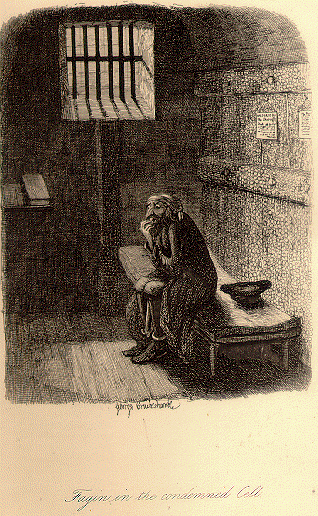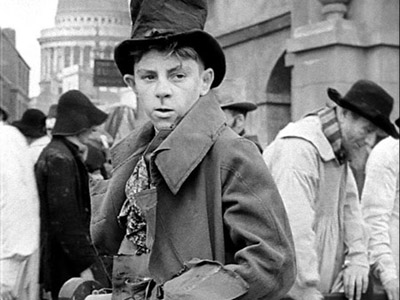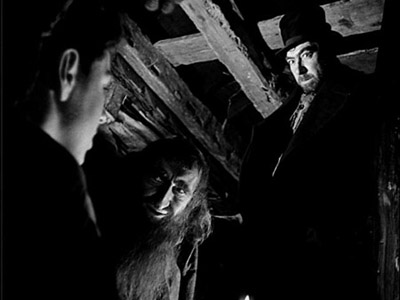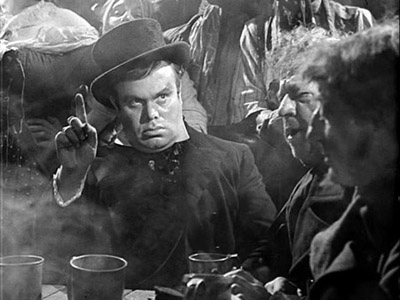Oliver Twist, 1948, directed by David Lean, screenplay by Stanley Haynes and David Lean from the novel by Charles Dickens.
John Howard Davies plays Oliver, a workhouse-raised orphan who escapes from his apprenticeship, flees to London, and falls into the clutches of his evil half-brother and a nearly-as-evil thief named Fagin. This is Lean's second Dickens adaptation, made two years after Great Expectations. I think it's a more impressive adaptation, although I liked it a little less as a film. Great Expectations was a later Dickens novel (begun in 1860; Oliver Twist began publication in 1837) and I responded pretty strongly to the doomed romanticism at its core (its core being, of course, Miss Havisham's rotten wedding cake). And although Great Expectations is certainly a Victorian novel, the endless series of betrayals that make up its plot seem very modern. In Oliver Twist, depicting the criminal underclass seems to still be a novelty for Dickens and he doesn't give Fagin or Sikes (or even Nancy) the kind of complexity he would later give Magwitch.
Which brings me to the genius of the screenplay. Since the villains are flatter than they are in Great Expectations, Lean turns Oliver Twist into something very close to a modern thriller. In Great Expectations, the screenplay more or less followed the events of the novel in the order they occurred; a great many incidents, subplots, and so on are omitted, but the general arc of the story remains the same. There's no such fidelity to the text in Oliver Twist; the great bulk of what happens onscreen is taken from the first book of the novel, in which Oliver goes to London, falls into the clutches of Fagin, escapes, falls back into the clutches of Fagin, and escapes again. The critical scenes from books two and three are wedged into the first book wherever they will fit, and anything that doesn't bear directly on Oliver is either omitted entirely or changed to focus on him. By doing this, Lean and Haynes solve what I see as a great structural weakness in the original novel: in the second and third books, Oliver himself does almost nothing. In book two, Monks begins his pursuit in earnest, bribing, threatening, and cajoling his way through the London underworld. Meanwhile, Oliver lies in bed and recovers from a gunshot wound. In book three, there are murders, fires, mobs, shootings, and all the thrills a moviegoer could want. While all this is going on, Oliver makes two trips by carriage and, in his most active moment, visits Fagin in his cell. After all the plot threads have been resolved and evil has been punished. And even that is too much for him; he nearly faints and has to sit down for an hour before he can summon the strength to walk out of the prison. It's decent reading, but not exactly cinematic. At the very least, a faithful adaptation would make for a strange movie, in which the main character disappears almost completely a third of the way in. Lean's version is tighter and more focused in a way that his version of Great Expectations was not; in Great Expectations you feel that large chunks of plot are missing, but Oliver Twist doesn't have that problem.
The film is also much different in tone than the novel. Once Sikes murders Nancy, it turns into a straight thriller, and his attempt to flee the mob pursuing him by escaping from the roof is as suspenseful as anything in a modern movie. Jack Harris edited both movies and did a spectacular job here; Sikes's death is one of the best sequences. And the sound editing and foley work that seemed overbearing in Great Expectations is very good here; when Sikes falls from the roof, the sound of the mob yelling drops out, and all you hear is the rope he's caught on sliding over the roof tiles until it cracks his neck. Those five seconds are the best of any of Lean's films.
The problem with making a movie of Oliver Twist is you've gotta do something with Fagin, who's right up there with Shylock on the list of unfilmably antisemitic characters. In the novel as originally published, he is more often referred to as "the Jew" than by name, and nearly every time Dickens has the opportunity to make a minor criminal Jewish, he takes it. Lean doesn't go as far as Dickens did with the character; there's no reference to his religion in the whole movie. And he cast Alec Guinness, who'd done such a great job as Herbert Pocket two years earlier, and is as British as can be. So far, so good. But the movie on the whole takes its visual cues from George Cruikshank's illustrations. Here's Cruikshank's Fagin:

And here's Alec Guinness:

Kind of a problematic makeup job. Guinness actually does his best to make Fagin as human as possible, and it's a pretty good performance. It's kind of hard to get past the gigantic prosthetic hook nose; the only time Guinness really transcends his makeup is in Fagin's final scene, where he howls with fury at the crowd outside as they break down the barricade he's built. I'm don't think you could make a version of Oliver Twist that felt like the novel without having Fagin be kind of offensive. And yes, it's faithful to Cruikshank's illustrations. But still: jeez.
One last thing: this movie is very well cast. Every character looks the way you'd imagine them. I didn't find this to be true at all in Great Expectations, so it was a relief here. The best example is Francis L. Sullivan, who I thought was horribly miscast as Jaggers in Great Expectations. I imagined Jaggers to be tall and thin, like the knife his name suggests, not a great fat man. On the other hand, it's difficult to imagine someone tall and thin whose name is Mr. Bumble. And Sullivan's Mr. Bumble is a pleasure to watch anytime he's on screen.
 Competence, thy name is Bumble!
Competence, thy name is Bumble!
And here's Anthony Newley's Artful Dodger:

It's not an issue here of the costumes so much as the faces; all these characters looked just the way I imagined them. That still leaves Fagin as a problem; but no more or less than he is in the novel.
Guy Green's cinematography isn't as showy as it is in Great Expectations, but it's still very good; here's just one of his very nice compositions. The Artful Dodger is explaining to Sikes that Nancy has betrayed them; the Dodger's to the left, Fagin is center, and Sikes is on the right, with his eyes about to pop out of his head with rage:

It's a nice, weird shot; what's strangest about it is that the camera starts the shot horizontal and kind of rolls back into position, looking up at Sikes, as he moves toward the Dodger. There's a lot of camera movement in the movie, usually when we're seeing things directly from Oliver's point of view. This technique doesn't always work for me; I think it tends to draw attention from to itself and take you out of the movie. I much prefer shots like the above, where you're sort of seeing things from the Dodger's point of view but it's not direct.
That's all for this one. If you can get past the antisemitism, there's a lot to learn from Oliver Twist. If you can't, well, you'll always have Great Expectations.
Randoms:
- There's one great "Hey, it's that guy!" moment in the movie, when you see the proprietor of The Three Cripples. Here he is:

- It took me the rest of the movie to place him; it's Peter Bull, who plays the Russian Ambassador in Dr. Strangelove (he's also in The African Queen).
- John Howard Davies, who played Oliver Twist, went on to become a television director, working on "Mr. Bean," "Fawlty Towers," and "Monty Python's Flying Circus."
- Fagin caused an understandable stir when the film came out, and it wasn't released in the U.S. until 1951 and then only in a version in which twelve minutes or so of Fagin had been excised. The movie was also banned in Israel for being antisemitic. It was also banned in Egypt, for not being antisemitic enough. I'm not making that up.
These movie reviews are generally of high quality and the pictures really add a lot to the review.
ReplyDeleteHave you considered approaching an online magazine (like Salon or Slate) and offering your services (for pay, of course)?
Thanks, man, I'm glad you're enjoying them. And yeah, I was really happy when I figured out how to get stills from the movie. W/R/T doing it for money, for now I'm happy to leave this as a hobby; it's a nice break from working on scripts and I'm learning a lot. I'm mostly interested in doing this as a learning exercise, really, so I can steal from the greats when the time comes. Not that I would turn down money if it came my way, of course.
ReplyDeleteYour blog came up when I was searching for illustrations of oliver twist, and what good fortune for me -- ! Keep up the good work
ReplyDeleteThanks for the encouragement. As you can see from the dates on the more recent posts, I've been slacking this summer, but now I'm back at it.
ReplyDeleteIs it just me or does the Artful Dodger look like a young Harpo marx?
ReplyDeleteMichael,
ReplyDeleteI think it's mostly the hat.
I don’t know whether David Lean’s Oliver Twist or his Great Expectations is the better Dickens adaptation. It’s been too many years since I’ve read either one of those novels. But I do know that I prefer Oliver Twist, and that has more to do with Dickens than with Lean. The problem is that when I think back on David Copperfield what I remember is Uriah Heep and Mr. Micawber. With Nicholas Nickleby it’s Squeers and Smike; with Great Expectations it’s Miss Havisham, Estella and Magwich. Pip, Copperfield and Nickleby are all a bit insipid and with time become indistinguishable from one another. But where Dickens’ adult protagonists come across as bland, Oliver comes across as innocent. And that to me is a more apposite lens through which to view the supporting characters.
ReplyDeleteFagin, Mammy, Vito Corleone can all be perceived as negative stereotypes. So should they never be played? That would be a mistake, because they are all important characters in great stories. I think that if the writer in adapting these characters to the screen dumbs them down and the actors play them too broadly, what you wind up presenting to the audience are indeed offensive stereotypes. But if the writer imbues a character with complexities and the actor matches that with a nuanced performance, then what is presented to the audience, even if some aspects remain stereotypical, is a multifaceted individual. If you’re painting an individual portrait rather than lampooning a race, then that shouldn’t give offense as readily.
I love the look of this film. Several discussions I saw online compare the look to the German Expressionists. But much of the lighting, the subjects, and many of the compositions reminded me of Caravaggio (for example when Old Sally dies). And I also admire the economy of Lean’s storytelling: a portrait of Bumble hanging on the Matron’s sitting room wall is all that is needed to reveal their marriage; a guinea in the sleeping Dodger’s hand tells us he has betrayed Nancy.
John B.,
ReplyDeleteJust wanted to say that I'm really enjoying your responses to these films. I maintain that the problem with Fagin was the fault of neither the writer, nor the actor, but the makeup artist, and no more excuseable than blackface. Although, judging the past by the standards of the present, &c., &c. But it's a creative decision that has not aged well.
Anyway, I always look forward to your comments, was the main thing, not least because it's been so long since I saw these films.
Matt,
ReplyDeleteGood to hear from you, and good to hear that you enjoy what I have to say. I continue to get a lot of enjoyment from this process. It's unlike anything else I have going in my day-to-day.
Regarding Fagin's nose: when I first read your essay I thought "how bad could it really be?" When I saw the film, I thought "Whoa!!" So I think it's reasonable to point a finger at the makeup artist. And while still quite prominent, this was toned down when Ron Moody and Ben Kingsley came to play the part.
Early congrats on your upcoming milestone: #100!!
I say, quite a good essay. I enjoy your wording and find the little asides comforting as they're not too lofty or pushy-intellectual ("Hey, it's that guy!").
ReplyDeleteHope you continue to do more. I too, found you after a google. I was looking for Anthony Newley as Dodger.
This is so typical of blogs. No money but endless enjoyment from the work and feedback.
Dane B. McFadhen